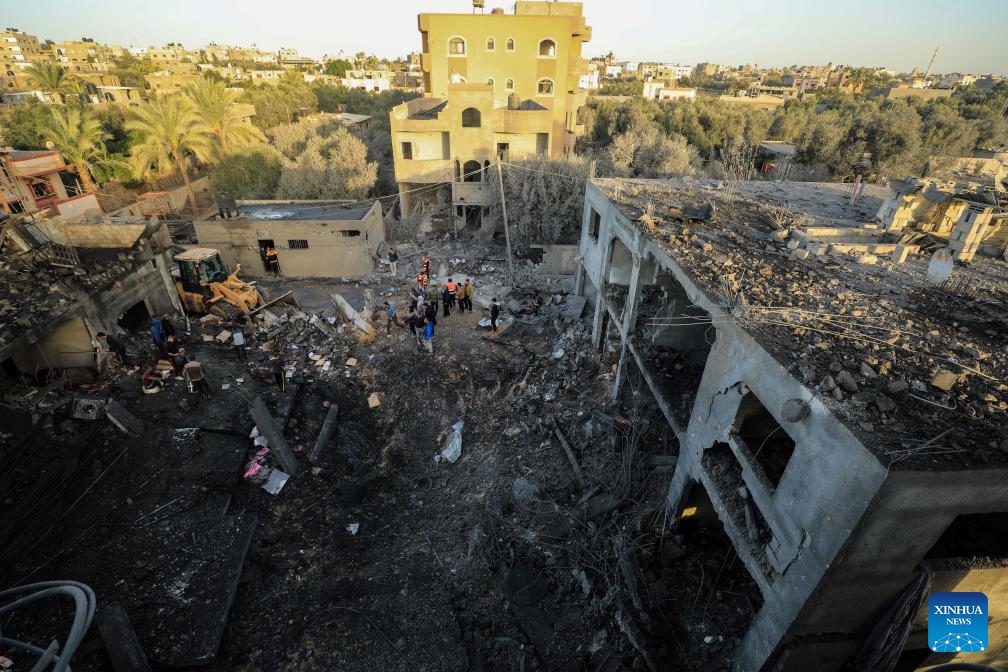
People conduct rescue work among the rubble of buildings destroyed in an Israeli strike in the southern Gaza Strip city of Khan Younis, on Nov. 23, 2023. Israel continued its attacks in the Gaza Strip on Thursday morning since the ceasefire deal reached between the country and the Gaza-ruling Hamas movement did not, as expected, come into effect on Thursday(Photo: Xinhua)
China on Thursday released a position paper on resolving the Palestinian-Israeli conflict, which offered five proposals on promoting peace, and achieving a comprehensive, just, and lasting resolution to the Palestinian issue, including immediately implementing a comprehensive ceasefire, effectively protecting civilians, ensuring humanitarian assistance, enhancing diplomatic mediation, and seeking a political solution.
The paper, titled “Position Paper of the People’s Republic of China On Resolving the Palestinian-Israeli Conflict,” was released one day after China, the rotating president of the UN Security Council for November, led a UN Security Council high-level meeting on the Palestinian-Israeli issue on Wednesday. Member of the Political Bureau of the Communist Party of China Central Committee and Foreign Minister Wang Yi travelled to New York to chair the meeting.
The paper stated that the current Palestinian-Israeli conflict has led to heavy civilian casualties and a serious humanitarian disaster. There is a high level of concern throughout the international community.
President Xi Jinping stated China’s principled position on the current Palestinian-Israeli situation on a number of occasions. He stressed the need for an immediate ceasefire and ending the fighting, ensuring that the humanitarian corridors are safe and unimpeded, and preventing the expansion of the conflict. He pointed out that the fundamental way out of this lies in the two-state solution, building international consensus for peace, and working toward a comprehensive, just and lasting settlement of the Palestinian question at an early date, according to the paper.
The paper noted that parties to the conflict should truly implement the relevant UNGA and UNSC resolutions and immediately realize a durable and sustained humanitarian truce. Building on UNSC Resolution 2712, the Security Council, in response to the calls of the international community, should explicitly demand a comprehensive ceasefire and an end to fighting, work toward de-escalation of the conflict, and cooling down the situation as soon as possible.
The paper also proposed to ensure the protection of civilians. It noted that it is imperative to stop any violent attacks against civilians and violations of international humanitarian law, and avoid attacks on civilian facilities. The Security Council should send a clear message on opposing forced transfer of the Palestinian civilian population, preventing the displacement of Palestinian civilians, and calling for the release of all civilians and hostages held captive as soon as possible.
Other proposals include ensuring humanitarian assistance, enhancing diplomatic mediation and seeking political settlement.
According to relevant UNSC resolutions and international consensus, the fundamental settlement of the question of Palestine lies in the implementation of the two-state solution, restoration of the legitimate national rights of Palestine, and the establishment of an independent State of Palestine which enjoys full sovereignty based on the 1967 border and with east Jerusalem as its capital, the paper noted.
A more broad-based, authoritative and effective international peace conference led and organized by the UN should be held as soon as possible to formulate a concrete timetable and roadmap for the implementation of the two-state solution and facilitate a comprehensive, just and lasting solution to the question of Palestine. Any arrangement on the future of Gaza must respect the will and independent choice of the Palestinian people, and must not be imposed upon them, according to the paper.




